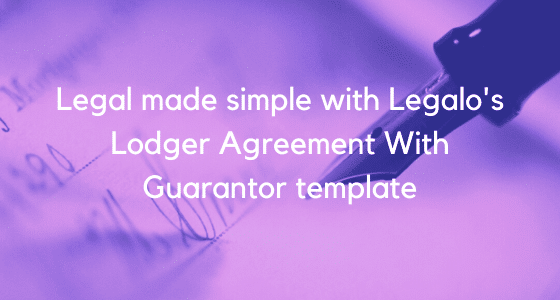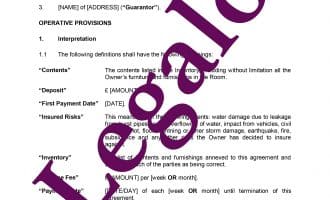Lodger Agreement With Guarantor
Our Lodger Agreement with Guarantor template:
- includes a guarantor
- solicitor-drafted template
- full guidance notes included
- 100% satisfaction guarantee

How Does It Work?
-
1. Download
-
2. Edit
-
3. Print
-
4. Sign
This is our lodger agreement template with provision for a guarantor. The guarantor is a party to the contract and then he guarantees the duties of the lodger under the agreement.
If you need our standard non-guarantor version, then please use our general lodger agreement template.
Our Guaranteed Lodger Agreement template is for use by a residential property owner when taking in a lodger to live in their home and whose obligations will be guaranteed by someone. Such obligations include:
- the payment of the rent; and
- also any other obligations of the lodger, e.g. not to damage the property.
The template is drafted in clear, plain English.
Tax issues with lodgers
There are good tax breaks for taking in a lodger, so if you have a spare room it makes great financial sense to take in a lodger. For more details see: https://www.gov.uk/rent-room-in-your-home/the-rent-a-room-scheme.
When should I not use a Lodger Agreement With Guarantor?
The notes on our general lodger agreement point out that it is only for use in certain situations (click here for the details). As with our general lodger agreement, if the lodger is not to (a) live with the landlord or a close member of the landlord’s family AND (b) share a key room, such as bathroom, kitchen or living room, then this is not a lodging situation. Instead, you should consider one of our more appropriate templates, such as:
- licence to occupy residential property if it is likely to be a short-term arrangement; or
- assured shorthold tenancy agreement if it is for a longer term.
The notes on those templates explain:
- when you should use them; and
- what rights the licensee or tenant has.
Lodger agreements for use in Scotland
Most of Legalo’s templates are written to comply with English law. However, you can also use this lodger agreement for properties located in Scotland. NB for Scottish properties with lodgers:
- The landlord can charge a deposit of 2 months’ rent maximum; and
- If the landlord moves out, the agreement will become a private residential tenancy. (We do not offer such a template yet.) The landlord should therefore issue the appropriate tenancy agreement as a replacement at that point.
Avoid anti-social behaviour
If you want a policy about the lodger avoiding anti-social behaviour, then see our separate policy for that.
Guide to our Lodger Agreement With Guarantor template
The majority of this agreement is the same as our general lodger agreement, as you might expect. For the guide to that template, please click here and then scroll down the page until you reach the guide section. The main differences with it are:
We have added the guarantor as an additional party to the agreement.
9. Guarantor
This new clause has been inserted, under which the guarantor gives the owner a guarantee that the lodger will comply with the terms of the agreement. Note that no guarantee is valid if only verbal – it must be in writing for you to be able to rely on it (section 4 of The Statute of Frauds 1677).
To ensure the guarantee is enforceable, you need to sign the agreement as a deed. The full guide includes instructions on how to do this.

FAQs on Lodger Agreements With Guarantors
Below, we have answered the top questions from the Internet on lodger agreements with guarantors.
What should be in a lodgers agreement?
A lodger agreement is a legal document in which the terms of renting a room in a homeowner’s property are laid out. It sets out information on rent, utilities, access to common areas, and house rules, as well as specifying the notice period and responsibilities of both parties.
Does a lodger need a guarantor?
Whether a lodger needs a guarantor depends on the terms laid out by the homeowner in the lodger agreement. It is not a legal requirement to have a guarantor for a lodger agreement, but the homeowner may request one, to make sure they have a reliable source of payment in the event of a lodger failing to pay their rent. If the lodger has no references from a past landlord, then considering requiring a guarantor is a good decision.
If you are a homeowner considering requiring a guarantor, it is vital to make this clear in the lodger agreement from the start.
How do I write a guarantor letter for a rental?
When writing a guarantor letter for a rental, you must state your willingness to be a financial guarantor for the lodger, providing the necessary personal details to the homeowner. You will need to confirm your ability to cover any costs not paid by the renter and other obligations that they may fail to fulfil.
However, the easiest way to do this is to use Legalo’s lodger agreement with a built-in guarantor clause. Simple and fast.
Can you add a guarantor to a lodger agreement?
You can add a guarantor to a lodger agreement by creating an additional section within the existing agreement outlining the guarantor’s responsibilities and obligations. This extra section can be filled in using our Lodger Agreement with Guarantor template. It should be read and agreed to by the guarantor before signing.
What is the guarantor wording for a lodger agreement?
A guarantor clause includes the guarantor’s name, contact information, and a clear statement showing their responsibility to fulfil the lodger’s financial obligations if they fail to do so themselves.
What are the responsibilities of being a guarantor for rented accommodation?
The main responsibility of a guarantor is to be financially responsible for a lodger’s rent if they fail to pay it, but there are other duties included in the role. For example, the guarantor may need to pay for any other costs related to the lodger agreement, such as:
- liability for damage caused;
- utilities;
- cleaning costs; and
- may also need to cover legal fees in case of any disputes in the future.
Is being a rent guarantor risky?
Being a rent guarantor can be risky, as you are agreeing to take on the financial obligations of the lodger if they default on their agreement with the homeowner. The long-term commitment is also an element that the guarantor needs to consider. It is also important to keep in mind the relationship between a lodger and their guarantor and how such an agreement may affect this.
Can a guarantor be released from a lodger agreement?
Once the parties have signed a lodger’s agreement with a guarantor, a guarantor cannot just come off it without the consent of the landlord. The legally binding agreement ties a guarantor into their role for the term of the lodging. However, there may be situations in which the landlord could release the guarantor from their duties before the end of the agreed period. This can happen if:
- the lodger’s financial situation improves to a point where the landlord no longer requires a guarantor; and
- the landlord and lodger sign a new agreement, removing the need for a guarantor.
What rights does a rent guarantor have?
Before a rent guarantor even signs the agreement, they have the rights to:
- consent to the role or decline it;
- independent legal advice if they want to consult with a lawyer before signing the agreement;
- clear understanding of their duties and notice of breach; and
- privacy and data protection, once they have handed over their personal details to a homeowner.
A guarantor won’t take responsibility for anything not in their initial agreement, financial or otherwise.
What does a landlord need from a guarantor?
A landlord usually requires the following when signing a lodger agreement with guarantor:
- Contact information;
- Guarantor application form (optional);
- Proof of identity;
- Proof of address;
- Proof of income; and
- Credit check consent.
The specific needs can depend on the terms of the agreement.
What checks does a landlord do on a guarantor?
A landlord may need to complete several checks on a guarantor, to assess their financial stability and suitability for the role. This can include a credit check, income proof and employment proof to confirm that the guarantor can fulfil their role. Landlords may also enquire about the guarantor’s previous rental history, as well as their legal and criminal background to ensure that they can be relied on in the role. The extent of checks can vary based on the landlord’s policies and terms of the lodger agreement.




